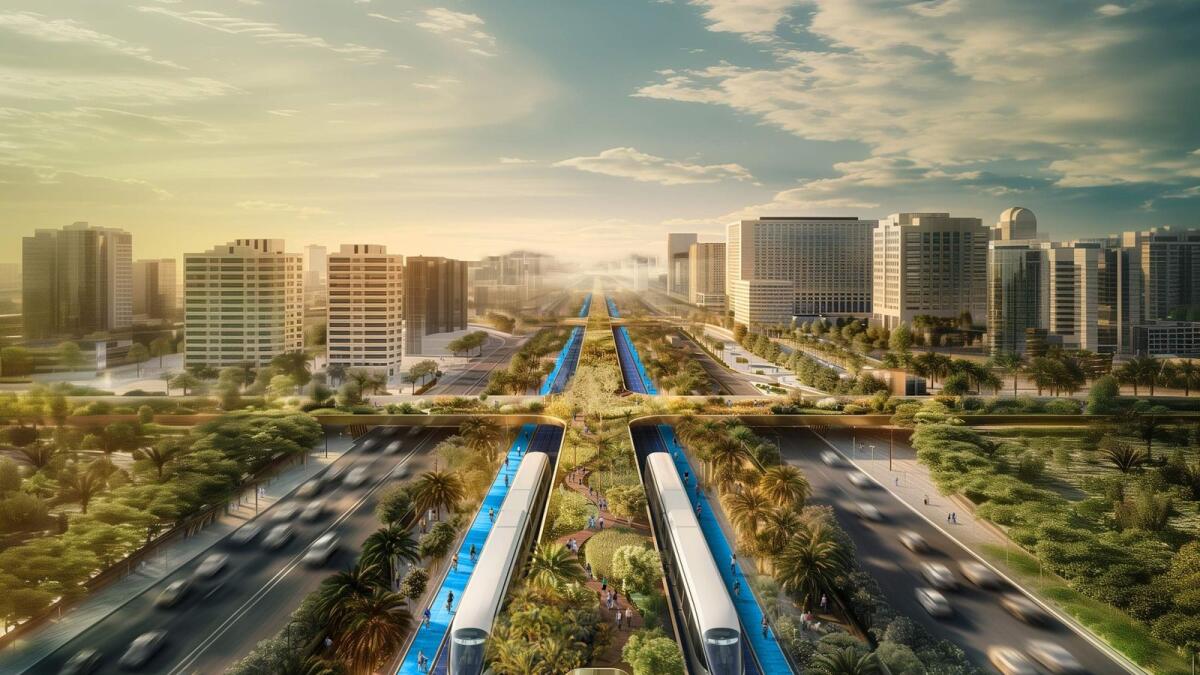A Dubai-based urban planning and development firm has revealed plans for an innovative tram project that would transform one of the busiest highways in the Emirate, Sheikh Mohamed Bin Zayed Road (E311). The proposed 64km corridor, known as the ‘Dubai Green Spine’, aims to incorporate 1 million trees, urban farms, and gardens along the route. The project, which is still in the concept stage, is estimated to cost $10 billion and would include about 25 tram stations. If approved, the Green Spine could be completed in four phases over a span of 10 years, covering a stretch from Dubai Industrial City to Muhaisnah.
One of the key features of the Green Spine project is its commitment to sustainability. The trams would be 100% solar-powered, with a 300-megawatt solar energy system supporting the operation of the transportation network. Solar panels would be integrated directly into the tracks, providing a constant source of power while reducing the need for overhead power lines, maintaining the visual aesthetics of the corridor. The estimated energy output from the project would be substantial enough to power approximately 130,000 homes in Dubai, contributing to the city’s renewable energy goals.
In addition to the tram system, the Green Spine project would include green walking and cycling tracks lined with native flora to provide natural cooling and cleaner air. The development would also feature pedestrian paths and cycling lanes designed to promote sustainable modes of transport and enhance the quality of urban life. Mixed-use assets, blending residential community amenities, commercial spaces, and leisure facilities, would create a vibrant and inclusive environment for residents and visitors alike.
The ‘Dubai Green Spine’ initiative aims to adopt a more human-centric approach focused on prioritizing people and green spaces over cars. By promoting sustainable modes of transport and community zones, the project seeks to enhance the overall urban experience while reducing reliance on traditional car-dominated roads. Urban agriculture initiatives, including vertical farms and community allotments for growing food, would further enhance the sustainability and self-sufficiency of the communities along the Green Spine corridor.
The Green Spine project also addresses environmental concerns such as urban flooding by incorporating sustainable urban drainage systems with porous surfaces that absorb rainwater. These eco-friendly drainage solutions help manage stormwater efficiently, reducing the risk of flooding even during heavy rainfall events. The development would also feature elevated parks with playgrounds, outdoor fitness areas, sports facilities, and community gardens, offering residents and visitors recreational spaces to enjoy.
URB, the firm behind the Green Spine project, has previously introduced other ambitious initiatives such as ‘Dubai Mangroves’, ‘Dubai Reefs’, and ‘The Loop’, which are still in the research and development phase. These projects demonstrate URB’s commitment to innovative urban planning strategies that prioritize sustainability, green spaces, and community well-being. As the Green Spine project progresses, it has the potential to revolutionize urban transportation, enhance environmental sustainability, and create a more livable and inclusive urban environment in Dubai.































